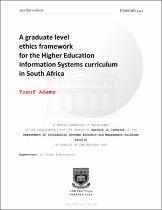A graduate level ethics framework for the higher education information systems curriculum in South Africa
Abstract
Purpose: The objective of this study was to fill a gap in the Information Systems (IS) literature oncerning the manner in which ethics are to be incorporated into the Information Systems curriculum to allow for accelerated learning by IS students in the field of ethics. This was accomplished by developing a framework that assisted Information Systems lecturers to embed ethics into the curriculum in ways that improved graduate comprehension and application of ethical principles during Information Systems learning, research and practice.
Methodology/design: This study used a single case study design, gathering data from two cohorts of IS graduates at a single university, before and after exposure to ethics teaching and learning that translated ethical considerations of AI systems into familiar IS concepts, such as input, process, output, and the technology-organisation-environment taxonomy.
Practical implications: This study added value to IS curriculum design as a discipline, clarifying how ethical principles that relate to IS are mapped to an existing undergraduate understanding of Information Systems – the existing curriculum, including a phased breakdown into input, design, and output, as well as IS concepts such as functional and non-functional system requirements.
Findings: Even after having received learning in ethics that were carefully embedded into relevant modules of the IS curriculum, students did not have a solid understanding of the essential ethical concerns required to create and design ‘ethical-by-design’ systems in the field of Information Systems.

